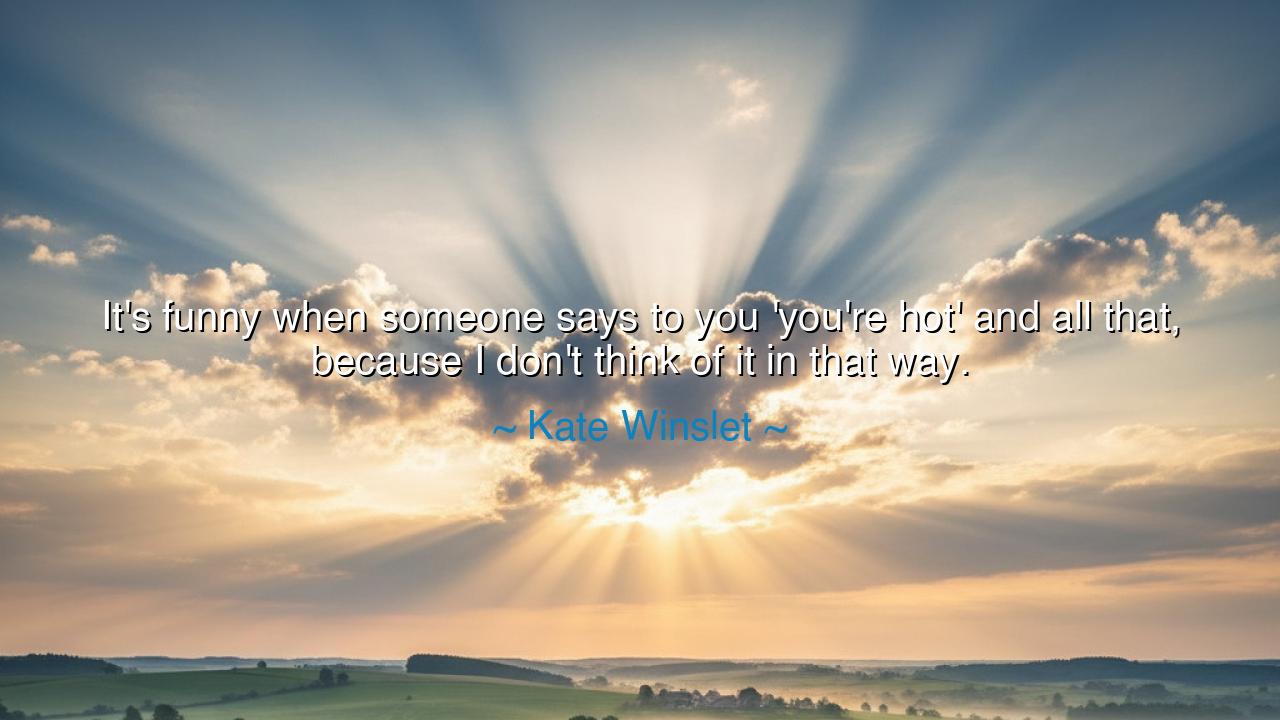
It's funny when someone says to you 'you're hot' and all that
It's funny when someone says to you 'you're hot' and all that, because I don't think of it in that way.






The words, “It’s funny when someone says to you ‘you’re hot’ and all that, because I don’t think of it in that way,” come from Kate Winslet, the English actress whose craft has transcended glamour and reached the realm of truth. These words, simple yet profound, reveal the quiet humility of a woman who sees beyond the illusions of beauty and fame. In them lies a timeless reflection on self-perception, authenticity, and the difference between how the world sees us and how we truly see ourselves. Winslet, though often praised for her grace and charm, reminds us that what the world calls “hot,” the wise call human—flawed, evolving, and real.
To the ancients, the danger of vanity was a recurring theme. They knew that to be praised for one’s appearance is to walk a delicate line between confidence and delusion. The philosopher Epictetus once said, “When a man praises you, think whether you have done anything worth his praise.” Winslet’s reflection echoes this same wisdom. When she says she does not “think of it in that way,” she is not rejecting admiration—she is refusing to be defined by it. For the eyes of others may see surface, but the soul lives beneath it. What she values is not how the world perceives her, but how she perceives herself—a truth that grants her freedom in an age obsessed with mirrors and masks.
Her words are also an act of rebellion against a culture that often measures worth by appearance. Winslet rose to fame through her role in Titanic, yet even then, she faced criticism about her body and image. Rather than conform to those shallow standards, she became a voice for authenticity and self-acceptance. Her quote reflects the wisdom of one who has seen how fleeting external beauty can be—and how dangerous it is to build identity upon it. She recognizes that what others call “hot” is but a momentary illusion, while what endures is character, courage, and truth.
Consider the tale of Socrates, the great philosopher of Athens, whose physical form was said to be plain, even homely. When mocked for his appearance, Socrates laughed and said that his face reflected the vastness of his mind. He was untroubled by judgment because he knew that real beauty arises not from symmetry or form, but from the harmony between soul and spirit. Winslet’s statement carries this same spirit—an understanding that beauty without depth is a hollow flame, burning bright but dying quickly, while inner truth glows like the eternal embers of the hearth.
In her humility, Winslet also reveals the paradox of the self-aware soul. The one who is truly beautiful seldom sees it, for their focus is turned inward, toward growth, empathy, and understanding. Those who dwell on their appearance often seek validation; those who dwell on their purpose become radiant without knowing it. Winslet’s humor—calling it “funny” when others praise her—shows the serenity of someone who has learned not to take flattery too seriously. It is the laughter of the wise, who see through the illusions of admiration and choose instead the quiet strength of authenticity.
This humility is a shield, not weakness. For the one who measures their worth by beauty or fame will be crushed when those fade, but the one who measures their worth by integrity will remain unshaken. Winslet’s attitude is a reminder that self-perception must come from within, not from reflection in the eyes of others. In a world that constantly tells us how we should look, act, and think, her words become a gentle rebellion—a call to define ourselves by our own values rather than by the fleeting approval of others.
So, my child, take this lesson to heart: do not mistake admiration for identity. When the world calls you beautiful, accept it with grace, but do not let it become your mirror. Seek instead to cultivate the beauty that cannot fade—the beauty of kindness, of honesty, of courage. Laugh, as Winslet does, when the world tells you what you are, for you alone know who you are meant to be. The truly radiant soul does not shine because others look upon it—it shines because it burns from within.
And thus, the actress’s simple, laughing remark becomes a teaching worthy of the ancients. True beauty is not awareness of being admired—it is the peace of not needing to be. Winslet’s wisdom reminds us that we are more than our reflections, more than our reputations. When you can smile at the world’s praise and say, “I don’t think of it that way,” you have found the secret balance between humility and confidence, between self-worth and self-forgetting. In that place of quiet grace, you will know the truest kind of beauty—the beauty of being wholly, unapologetically yourself.






AAdministratorAdministrator
Welcome, honored guests. Please leave a comment, we will respond soon